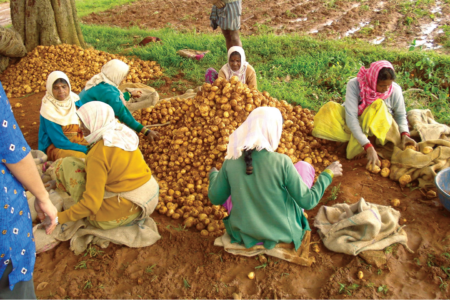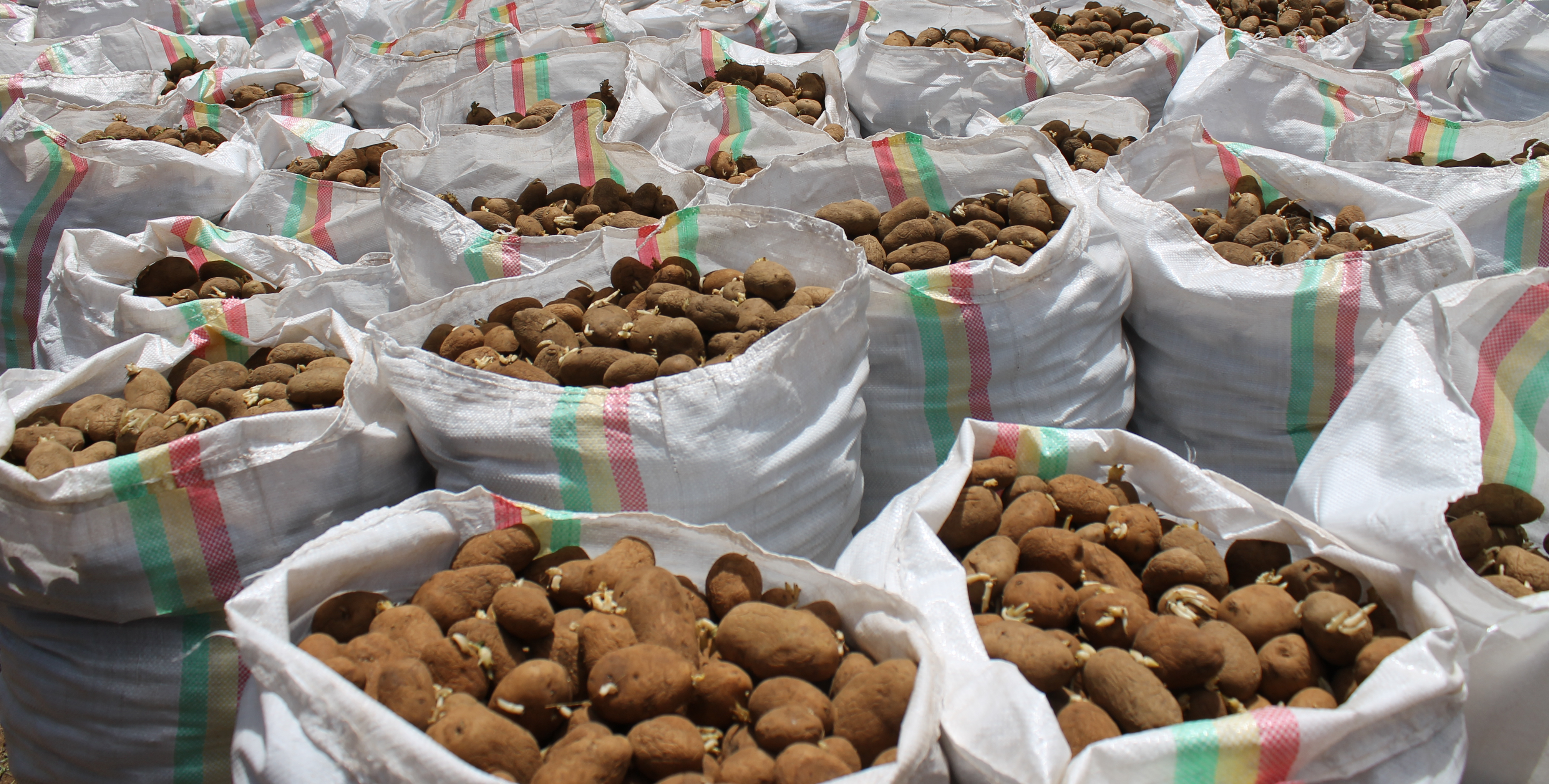
Potatoes with high levels of iron, zinc and vitamin C hold great promise for boosting nutrition and food security throughout East Africa. This project builds on 15 years of CIP research to introduce improved biofortified potato clones to Ethiopia and Rwanda for evaluation, along with a package of support to build capacity for effective dissemination throughout the region.
Background
Globally, an estimated 1.6 billion people suffer from iron and zinc deficiencies, which primarily affect young children and women of childbearing age. Severe cases can result in childhood stunting, hindered mental development, susceptibility to infections, and maternal mortality.
CIP scientists have been working over the past 15 years to address micronutrient deficiency by developing biofortified potato varieties. The process began by conducting laboratory analysis of approximately 200 native Andean landraces, resulting in the identification of 16 varieties with high levels of iron, zinc, and vitamin C. Breeders then spent a decade crossing these and selecting offspring with even higher nutrient levels in a process known as biofortification. The resulting clones have 40–
80% more iron and zinc than commonly grown varieties. Biofortified potatoes also contain high levels of vitamin C, which facilitates the absorption of iron, and low levels of phytates, which inhibit the absorption of iron. These potatoes therefore have the potential to make a significant contribution to reducing micronutrient malnutrition.
Although cereal-based diets predominate, potato is grown widely in East Africa. It is an ideal food security crop for challenging conditions, since it is highly efficient in facilitating the transformation of water into calories, has a short maturity period, and can be harvested during the ‘hunger months’ before the cereals ripen. While biofortified potatoes have been promoted in East Africa for several years, they generally have lower yields and are less resilient than other improved varieties. CIP plant breeders have thus performed crosses with their advanced potato populations, resulting in a new generation of biofortified clones with higher yields, improved resistance to late blight and virus diseases, and better resilience to climatic stresses.
The next stage in this project builds on these successes and aims to make new high-yielding, disease-resistant, climatesmart biofortified potato varieties available throughout East Africa. The project includes a package of support to build local capacity and promote sustainable and widespread dissemination.
Objectives
- Deliver 50 late blight and virus-resistant, biofortified potato clones to Ethiopia and Rwanda, keeping copies in quarantine screenhouses in Kenya.
- Identify and promote selected iron- and zincrich varieties.
- Multiply the best performing varieties and evaluate them under local field conditions.
- Strengthen capacities of national agricultural research partners to determine iron and zinc levels.
- Compare seven commonly grown varieties in Rwanda with the new biofortified potatoes under similar seed health and management conditions.
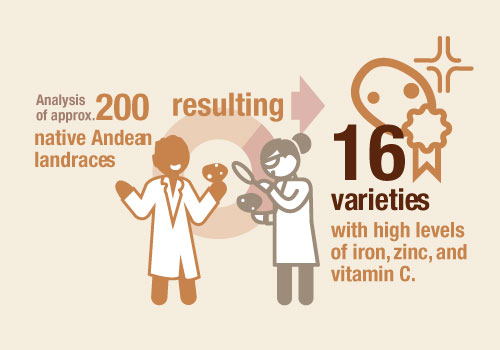
Approach
In addition to supplying biofortified potatoes developed through CIP’s breeding program, the project has identified suitable breeding lines by assessing the yields, and iron and zinc concentrations of popular Ethiopian and Rwandan varieties. These will be used as controls in new variety assessment trials and could be crossbred to improve adaptation to local growing conditions.
Support services to be developed include eliminating viruses from selected breeding stock and ensuring phytosanitary certification meets international quarantine standards. The project also seeks to build local capacity on mineral analysis as well as potato breeding and selection. The next phase focuses on germplasm screening, capacity building, crop improvement, field evaluation and selection, and seed multiplication for an iron dietary bioavailability study
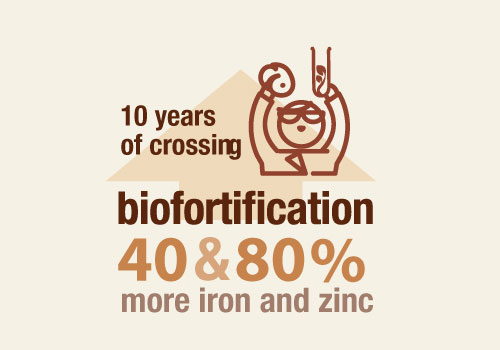
Approach
- In 2018, CIP sent 57 biofortified, disease and virus resistant clones to Kenya for multiplication in Ethiopia and Rwanda. The selection of the best clones will be further refined by participatory variety selection. Ensuring farmer and consumer acceptance, the best 5–10 clones will be evaluated in several locations in Ethiopia and Rwanda to assess their potential for release there in the coming years.
- Strengthened capacities of laboratory technicians on analysis of iron and zinc in potato samples in Ethiopia and Rwanda in preparation for the scaling biofortified potatoes. The next phase will provide training to ensure improved calibration for certain types of potato samples, and better workflows in field sampling and sample preparation
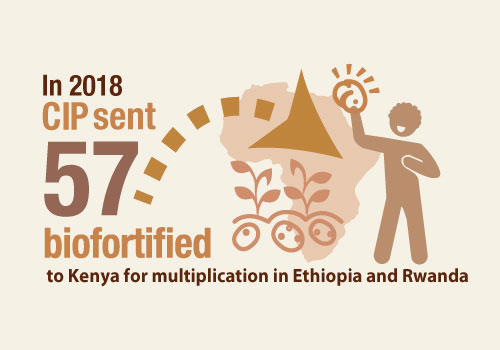
Expected outcomes
- The assimilation in the gastrointestinal tract of the iron and zinc from biofortified potatoes, enhancing health outcomes. CIP and partners have already conducted in vitro bioaccessibility evaluations in Peru, but there is a need for additional research, and this will require multiplication of the best biofortified varieties.
- Greater understanding of the concentration and effect of polyphenolics, vitamin C and phytates—which can be iron absorption enhancers and inhibitors—in promising biofortified clones.
Contact
Berga Lemaga
CIP, Ethiopia
b.lemaga@cgiar.org
Thanks to our donors


